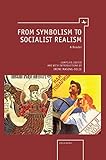From Symbolism to Socialist Realism : A Reader / ed. by Irene Masing-Delic.
Material type: TextSeries: Cultural SyllabusPublisher: Boston, MA : Academic Studies Press, [2012]Copyright date: ©2012Description: 1 online resource (474 p.)Content type:
TextSeries: Cultural SyllabusPublisher: Boston, MA : Academic Studies Press, [2012]Copyright date: ©2012Description: 1 online resource (474 p.)Content type: - 9781618112323
- 9781618111449
- online - DeGruyter
| Item type | Current library | Call number | URL | Status | Notes | Barcode | |
|---|---|---|---|---|---|---|---|
 eBook
eBook
|
Biblioteca "Angelicum" Pont. Univ. S.Tommaso d'Aquino Nuvola online | online - DeGruyter (Browse shelf(Opens below)) | Online access | Not for loan (Accesso limitato) | Accesso per gli utenti autorizzati / Access for authorized users | (dgr)9781618111449 |
Frontmatter -- Table of Contents -- Acknowledgements -- Preface -- Section One. Russian Culture before the October Revolution -- Introduction -- Historical-Cultural Contexts -- Father Gapon and the St. Petersburg Massacre of 1905 -- The Assassination of Grand Duke Sergei -- Modernist Views on Art in Essays and Manifestos, Criticism -- Keys to the Mysteries -- Two Tendencies of Contemporary Lyric Poetry -- Art as Technique -- Slap in the Face of Public Taste -- Declaration of TransrationaL Language -- “The Cherry Orchard” -- ’The Marble Bust’ and Briusov’s Vision of Art -- Vignettes -- The Marble Bust: A Tramp’s Story -- The Stranger -- When in a Suicidal Anguish -- The Lost Streetcar -- Section Two. From Civil War to Stalinism via Nep -- Introduction -- Everyday Life: Reality and Dreams -- Attic Life -- Make way for Winged Eros: A Letter to Working youth Love as a Socio-psychological Factor -- The New Way of Life -- On Literature, Revolution, Entropy, and Other Matters -- Literary Criticism -- Zamyatin’s WE, the Proletarian Poets and Bogdanov’s Red Star -- Bright Hopes and Dark Insights -- Bulgakov’s Early Tragedy of the Scientist-Creator: An Interpretation of The Heart of a Dog -- The Masks of Mikhail Zoshchenko -- Through the Wrong End of Binoculars: An Introduction to Iurii Olesha -- Two Plays -- Vignettes -- Brothers, Let’s Glorify the Twilight of Freedom -- A Dogged Sense of Smell -- Nervous People -- Brooklyn Bridge -- Section Three. The Stalinist Period and World War II -- Introduction -- Memoirs -- 1930: How Meierkhol’d Put on My Play -- Ivanov-Razumnik, from The Memoirs of Ivanov-Razumnik -- Antonina Pirozhkova, from At His Side: The Last Years of Isaac Babel -- Cultural Contexts -- The Mystery and the Magic of Stalin’s Power -- The Tower of Babel Undone in a Soviet Pentecost -- Tchaikovsky as Communist Icon -- Power Relationships and Authorship -- Soviet Labor Camps: A Brief History -- Socialist Realism -- Soviet Literature -- Socialist Realism in Soviet Literature -- The Typology of the Nonexistent -- War Diary -- Excerpts -- Vignettes -- We Exist in a Country Grown Unreal and Strange -- Russia, Our Happiness. Russia, Our Light -- This Thing Called Homesickness! A Fable -- No Matter How the Soviet Tinsel Glitters -- Song about our Motherland -- A Word to Comrade Stalin -- Epilogue. After WWII and after Stalin -- Comments on the Epilogue Selections -- A Denunciation -- The Central Committee Resolution on the Journals Zvezda and Leningrad -- Memoir -- Evgenii Evtushenko, from Yevtushenko’s Reader: The Spirit of Elbe; A Precocious Autobiography; Poems
restricted access online access with authorization star
http://purl.org/coar/access_right/c_16ec
Developed as a reader for upper division undergraduates and beginning graduates, From Symbolism to Socialist Realism offers broad variety of materials contextualizing the literary texts most frequently read in Russian literature courses at this level. These approaches range from critical-theoretical articles, cultural and historical analyses, literary manifestos and declarations of literary aesthetics, memoirs of revolutionary terrorism and arrests by the NKVD, political denunciations, and “literary vignettes” capturing the spirit of its particular time in a nutshell. The voices of this “polyphonic” reader are diverse: Briusov, Savinkov, Ivanov-Razumnik, Kollontai, Tsvetaeva, Shklovsky, Olesha, Zoshchenko, Zhdanov, Grossman, Evtushenko, and others. The range of specialists on Russian culture represented here is equally broad: Clark, Erlich, Grossman, Nilsson, Peace, Poznansky, Siniavskii, and others. Together they evoke and illuminate a complex and tragic era.
Mode of access: Internet via World Wide Web.
In English.
Description based on online resource; title from PDF title page (publisher's Web site, viewed 01. Dez 2022)


